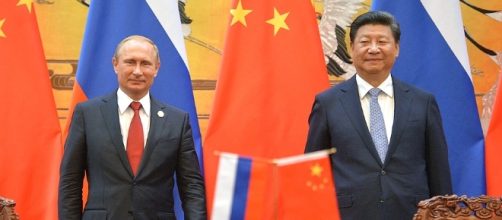While President Trump recent decried china's efforts to contain North Korean aggression as insufficient, the meeting that just took place in Moscow between Vladimir Putin and Xi Jinping would put Trump's narrative under suspicion.
News reports from major Chinese media sources reported that both leaders agreed that North Korea had to be dealt with, and that the solution would be reached via dialogue and negotiation. At the time North Korea hadn't fired their latest ICBM, and this action may change the view that China takes to the small, aggressive nation.
Well defined borders
China has been moving closer to taking military action against North Korea for many months, and reliable reports from a South Korean news agency put more than 150,000 Chinese troops on the border of China and North Korea.
Russia has also confirmed the presence of a substantial military deployment to their small border with North Korea, though so far there has been no aggressive action taken by anyone.
The military deployments by both nations predate the recent meeting in Moscow, however, the Chinese Ambassador to the UN, Liu Jieyi, said yesterday that the situation in North Korea was "very, very serious," and that it could become “out of control,” if measures aren't taken soon.
It is highly unlikely that the Ambassador would have spoken so strongly without Beijing's blessing, especially in such a public arena. This may mark a new era in Chinese strategic thinking, as they are also due to chair the UN security counsel in the next rotation
Multi-state madness
The G20 meeting in Hamburg began today, and there was no small amount of street violence on display. The real show will happen behind closed doors, and with the recent show of solidarity from China and Russia, President Trump may be the odd man out.
Trump's vitriol plays well with his constituency, but it is not winning him any friends in the world arena.
His recent decision to send a US destroyer into contested waters in the South China Sea was not wise from the perspective of solidifying ties with China, and Xi Jinping is also unlikely to appreciate the recent sanctioning of Chinese financial firms that had limited ties with North Korea.
What is perhaps more dangerous is Trump's inability to see the coordinated action that is taking place in Eurasia. Continued US antagonism of China may not have immediate results, but eventually they are likely to demand the respect of their maritime boundaries.
The form that action will take is unknowable, but we have to hope that it doesn't end with “The Tweet heard 'round the world.”


